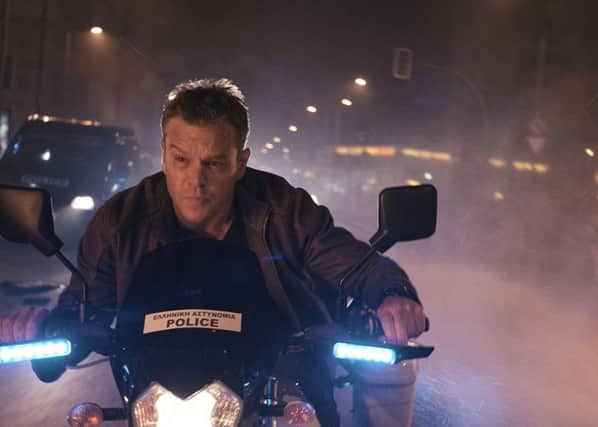Film reviews: Jason Bourne, Finding Dory, Born to be Blue


When we first catch up with him, though, he’s living off the grid in Greece, punishing himself for past misdeeds by participating in gnarly underground fight clubs. Lest we miss the blunt symbolism of these pugilistic pursuits, a figure from his past pops up to tell him that he’s punished himself enough; what he really needs to do is confront the remaining layer of intrigue regarding his decision to join the CIA.
Jason Bourne (12A) **
Finding Dory (U) ***
Born to be Blue (15) ***
The messenger is Nicky Parsons (Julia Stiles), his former handler who, like Bourne, went underground at the end of Ultimatum. In the post-Snowden landscape in which the new film operates, she’s been working with an egotistical Julian Assange-like whistleblower to hack the CIA – a nifty plot-catalysing set-piece that brings the series into the era of big data and sets up the notion of the security services covertly working with Silicon Valley to monitor every move the public makes.
Advertisement
Hide AdThat’s good, zeitgeisty material for returning director Paul Greengrass, who made the series his own with the politically resonant second and third instalments. Too often, though, he falls back on the technological wherewithal of the surveillance community to propel the action forward in ways that are convenient for the plot but make little sense for the characters. Guys like Bourne don’t make mistakes, we’ve been told in the earlier films, yet the first act hinges on Bourne and Nicky wandering around Athens in the midst of anti-austerity rallies with nary a thought given to the multiple cameras documenting the erupting chaos.
All too easily tracked thanks to advances in facial recognition software, they’re soon thrust into the film’s first big action set-piece, an elaborate attempt to top Ultimatum’s Waterloo Station sequence. Featuring Vincent Cassel’s vendetta-harbouring rival agent and a motorcycle chase through the petrol-bombed streets of the Greek capital, it is, in some respects, Greengrass’s homage to the protest scene in Doctor Zhivago, his own eponymous hero caught up in the tumultuous forces of history. But as breathlessly executed as it is, familiarity with the rest of the series makes it feel rote, the inevitability of its conclusion undermining any tension as it becomes all too apparent that its main purpose is to provide cheap motivation for Bourne to once again pursue the big guns running the show.
Here, a typically craggy Tommy Lee Jones all but phones in his performance as Robert Dewey, the long-serving director of the CIA whose whatever-it-takes attitude to national security belies a murky past with a direct link to Bourne’s origins. His bad-old-days approach is being challenged by Alicia Vikander’s cyber-terrorism expert, Heather Lee, a CIA millennial with the confidence to go above her pay grade and convince the agency she can appeal to Bourne’s left-leaning patriotism to bring him in.
Bourne, meanwhile, has an encrypted flash-drive full of classified files relating to both his past and the CIA’s future and his efforts to recover this information pinball him from Greece to Berlin to London to Las Vegas, ostensibly to uncover the truth, but also to enable Greengrass to string together a series of increasingly preposterous, budget-justifying action sequences.
Through it all, Damon soldiers grimly on as the taciturn hero, still using his CIA codename despite knowing his real identity for years. The film tries to make this last fact some sort of inquiry into the character’s true nature, but mostly Bourne feels redundant as a character, someone going through the motions of combating clandestine government forces, not because he has to, but because he’s expected to. When the finale paves the way for yet another sequel, it’s clear Jason Bourne is once again a compliant foot soldier – this time in the service of a Hollywood studio desperate for an asset it can exploit for years to come.
In an amusing twist of distribution fate, this week’s other big release is also a belated sequel featuring a memory-deficient protagonist. There the similarities between Jason Bourne and Finding Dory mostly end – save, perhaps, for the mild disappointment that comes from Pixar revisiting yet another of its first wave of animated classics instead of coming up with another conceptually daring original film. Nevertheless, this follow-up to 2003’s Finding Nemo is stuffed to the gills with gags and generates plenty of empathy for the Ellen DeGeneres-voiced Dory as she embarks on an intuitive journey to a find her long-lost family despite remembering very little about them.
Advertisement
Hide AdFinally this week, Born to Be Blue finds Ethan Hawke making a valiant attempt to body-swerve the squandered genius clichés integral to the life story of heroin-addicted jazz trumpeter Chet Baker. Focusing on a brief transitional period in his mid-forties when Chet was trying to rebuild his career, Hawke offers more of an impression than a definitive portrayal, yet even though the film won’t fully commit to its more experimental flourishes, Hawke makes it feel truthful in a way that conventional music biopics rarely manage. ■